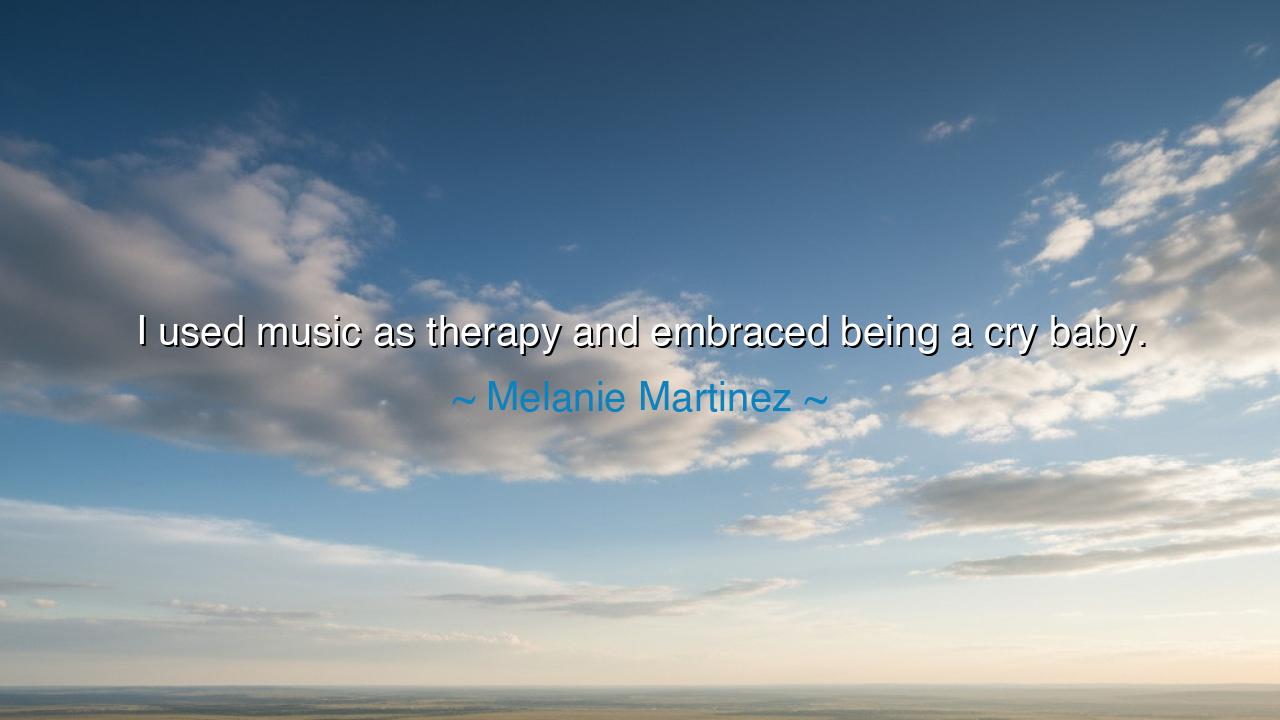
I used music as therapy and embraced being a cry baby.






“I used music as therapy and embraced being a cry baby.” Thus spoke Melanie Martinez, a singer whose art transforms wounds into melodies, whose voice carries the hidden sorrows of the heart. Her words are not merely confession but revelation, for in them lies the eternal truth that music is not only a craft or an entertainment, but a healing balm. She declares that tears, often despised as weakness, can be turned into power when embraced and woven into song. To be a “cry baby” is no longer shame—it is transformation, the alchemy of pain into beauty.
The ancients, too, knew this secret. The Greeks taught of the catharsis of tragedy, where the audience, weeping at the fate of heroes, found their own souls cleansed. The Hebrew psalmists raised laments that turned grief into praise. The shamans of many tribes sang their chants to heal sickness, not by denying sorrow but by giving it voice. In all these, the power of music as therapy was honored: to speak aloud the unspeakable, to let sorrow flow until it became strength. Martinez’s words stand as a modern echo of this ancient wisdom.
Her own life illustrates the meaning of her saying. Rising to fame with her unique vision, she built her work around the imagery of childhood—nursery rhymes, toys, the fragile world of innocence. Yet within that world, she placed themes of trauma, pain, and vulnerability. By calling herself a cry baby, she did not flee from her tears but exalted them. She taught her listeners that to cry is not to be weak, but to be alive. Her music became her medicine, and in turn, her medicine became the healing of countless others who found their own stories reflected in her songs.
History too gives us examples of this path. Consider the great blues singers of the American South. Their lives were burdened with poverty, oppression, and sorrow, yet they found release in the twelve bars of song. To hear Bessie Smith or Robert Johnson was to hear wounds sung aloud, transformed into rhythm and melody. Their crying became music, and their music became therapy, not only for themselves but for generations. What Melanie Martinez speaks of is no small thing: it is a lineage of artists who turned their pain into a lantern for others.
The lesson is profound: do not despise your tears. The world may call you weak, may scorn you for being fragile, may tell you to hide your cries. But know this—your tears are rivers that cleanse, your vulnerability is soil where true art grows. To embrace being a cry baby is to accept yourself wholly, even the parts the world urges you to bury. In that acceptance, you will find strength, and in expressing it, you may give strength to others.
O seekers of wisdom, remember this truth: what you repress will chain you, but what you embrace will free you. Turn your pain into music, whether with instruments, with words, with art, or with the simple honesty of your living. Share your struggles rather than hiding them, and you will discover that the world is filled with others who weep as you do, and who need your courage to face their own tears.
In practice, this means finding your own form of therapy in expression. If not music, then writing. If not writing, then painting. If not painting, then simply speaking your truth to one you trust. Do not deny your tears; channel them. Create something from them. In doing so, you will not only heal yourself, but you will place healing into the hands of those who encounter your work.
Thus Melanie Martinez’s words endure: “I used music as therapy and embraced being a cry baby.” They are not an admission of weakness but a triumph of honesty. They remind us that true strength is not in silence but in expression, not in hiding sorrow but in transforming it. Embrace your tears, and let them sing—for in their sound lies the deepest healing of the soul.






AAdministratorAdministrator
Welcome, honored guests. Please leave a comment, we will respond soon